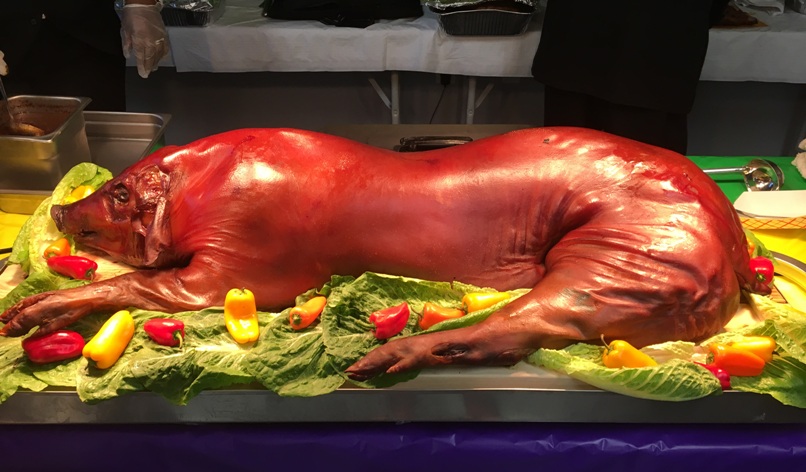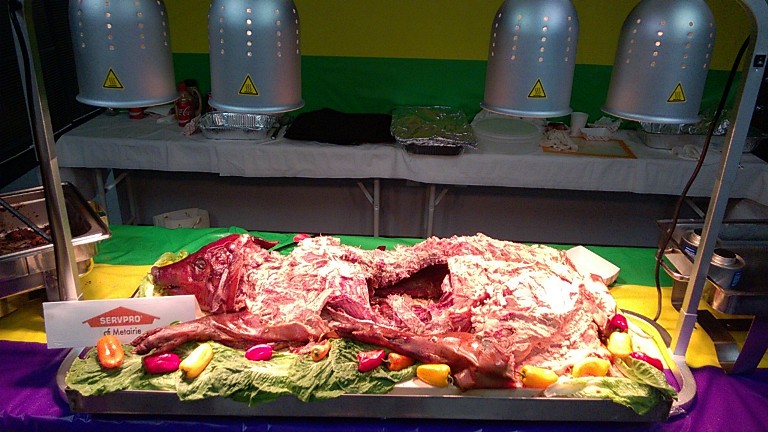 Aurora Catering's
Aurora Catering's
 Aurora Catering's
Aurora Catering's
 Cochon de Lait (Roast Pig)
Cochon de Lait (Roast Pig)
Yield - 100 -125 Buffet Servings
Ingredients
1 90 - 125 LBS HEAD ON PIG (Split lengthwise)
2 CUPS GARLIC TOES (Peeled, whole)
2 BUNCHES SHALLOTS (Washed, root bottoms removed)
Dry Seasonings
2 TBSP SALT
1 TBSP BLACK PEPPER
1 TBSP GROUND CAYENNE PEPPER
1 TBSP WHITE PEPPER
3 TBSP GRANULATED GARLIC
2 TBSP SPANISH PAPRIKA
Pit
20 10’ LENGTHS OF 1/2” or 3/4” EMT CONDUIT
1 SPOOL BAILING WIRE
5’x 6’ EXPANDED METAL GRATING
LOT HARDWOOD (Pecan, Oak, Cherry or Hickory)
1 QUART COOKING OIL
Method
Cut an “X” in the pig meat with a sharp fillet knife. Stuff one or two toes
garlic into each hole, then stuff a shallot into the hole. Cut the shallot at the skin
line. Continue stuffing the pig in all the meaty areas until all of the garlic and
shallots are used. Don’t forget to include the underside of the pig. Mix the
seasonings in a stainless steel bowl and dust the pig generously. Pat the seasonings into
the pig flesh.
Pit Construction
Dig a 5 foot by 6 foot pit about 12 to 18 inches deep. Cut 3-1/2 foot long pieces from the
conduit,. Hammer the cut pieces into the ground, leaving about 14” to 18”
sticking out of the ground. Use the bailing wire to lash the longer piece to the stakes to
form a grill. Before you put the grating over the pit, wad up newspaper and other kindling
and place in the bottom of the pit. Stack 20 to 25 pieces of hardwood in the pit and douse
with the cooking oil. Next, place the grating on top of the pit and secure with bailing
wire. Run a hose to the pit, this is a great safety measure and might come in handy if the
pigs start to fire.
Cooking Method
About 14 hours before service, light the pit and allow the wood to burn down to embers.
(This will take about 1 -1/2 to 2 hours.) Remove some of the glowing coals and start a
breeder fire on side of the cooking pit. Add fresh hardwood to the breeder fire so that
when additional coals are required they can be pulled from this fire.
The grill temperature should be very warm but not hot. A good check is to hold your hand over the grill for about 10 seconds without discomfort. If you can hold it there for any extended period than the grill is too cold. If you cannot hold it there greater than 5 seconds, the pit is too hot and the grease from the pigs will catch fire and burn the meat.
Place the pig halves skin down on the grill, ensure that no open flame is directly below the meat. Add hot embers to maintain the grill temperature. Turn the pigs about once each hour. As the pigs cook, they will drip grease into the embers and a column of smoke will rise over the pigs and give them a smoky flavor. Concentrate the embers under the shoulders and hams; these areas are thicker and require more heat for the pig to cook evenly. If a flame develops under the meat pat it out with the back end of a shovel. Sometimes a fire will start and more fire fighting measures are required, first try shoveling some dirt on top of the grease fire, or use a rake to spread out the coals. As a last resort use the hose to douse the fire. You may have to replenish embers from the breeder fire.
 Smoke- roast the pig halves for 11 - 13 hours. When done the bones will
literally fall from the meat.
Smoke- roast the pig halves for 11 - 13 hours. When done the bones will
literally fall from the meat.
Alternate Method
Most fresh pigs are very fatty and thus require little basting. However, some pigs come
directly from the woods and are wild. For these I suggest that a butter-garlic-wine
basting sauce be available during cooking. This will keep the meat moist and tender.
Plate Presentation
Serve the ribs and center section first, these are the thinner sections of the pig and are
usually done first. The hams and shoulders are thicker and the meat will continue to cook
internally.
Chef's Notes:
This is our recipe for our family’s Pig Fest. We’ve been doing this since 1980
and still going strong.
![]() to Home Cookin' Page or Return to
to Home Cookin' Page or Return to ![]() Table of Contents
Table of Contents
![]()
Chef Emile L. Stieffel, Aurora Catering, Inc. email address: ChefEmile@CustomCatering.net
Copyright © 1995 Aurora Catering, Inc. All rights reserved.
Revised: March 23, 2017